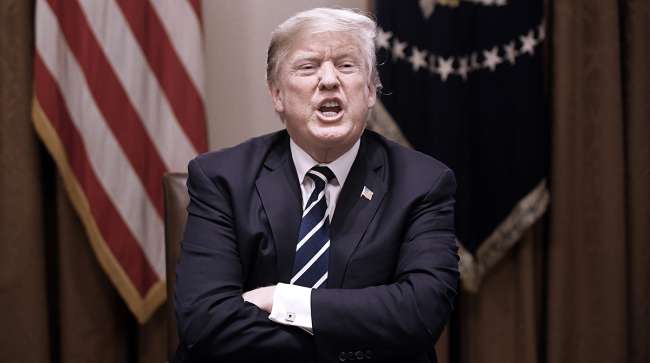Trump Blasts Fed Rate Hikes, Says Strong Dollar Hurts US

President Donald Trump lashed out at China and the European Union for their weak currencies and said a stronger dollar and rising interest rates are undermining America’s “competitive edge,” taking a fresh jab at the Federal Reserve. Stocks and the dollar fell.
“China, the European Union and others have been manipulating their currencies and interest rates lower, while the U.S. is raising rates while the dollars gets stronger and stronger with each passing day — taking away our big competitive edge,” Trump tweeted early July 20. “The United States should not be penalized because we are doing so well.”
In an apparent reference to Fed rate increases, Trump added, “Tightening now hurts all that we have done. Debt coming due & we are raising rates — Really?”
Trump’s comments mark the latest twist in an escalating trade war with countries the president accuses of trading unfairly, raising the prospect that the conflict could also morph into a currency spat. Until now, Trump mostly has focused on using tariffs as leverage to try to persuade China and other nations to open up their markets.
RELATED: Bernanke says US economy faces ‘Wile E. Coyote’ moment in 2020
In a CNBC interview that aired earlier July 20, Trump said he’s “ready to go” with tariffs on $500 billion of Chinese goods, approximately the value of all U.S. imports from the Asian nation last year. “We are being taken advantage of, and I don’t like it,” he said.
Trump is breaking with decades of tradition that presidents avoid commenting directly on the dollar or the path of U.S. monetary policy. The latter is usually seen as the domain of the Fed, while the U.S. Treasury secretary typically is the chief spokesman on the dollar. For years, the United States has hewed to the idea that a strong dollar is good for the U.S. economy.
Trump’s comments also come during a week when he’s facing growing pressure over his relationship with Russian President Vladimir Putin. Trump came under fire this week for his lukewarm support for the finding by U.S. intelligence agencies that Russia meddled in the 2016 election.
The president’s comments likely put a ceiling on the recent U.S. dollar rally so far this year, said Viraj Patel, a foreign-exchange strategist at ING Bank NV.
RELATED: Many Americans missing solid job market’s bounty, Fed poll shows
There’s a risk the dollar “de-couples from interest-rate differentials as investors come to terms with the White House’s mercantilist U.S.-dollar policy,” Patel said.
Trump’s comments that China and the EU are manipulating currencies contradict a Treasury Department semi-annual report released in April that refrained from naming any country a currency manipulator based on specific criteria.
Trump on July 19 criticized the Fed’s series of rate increases, breaking with more than two decades of White House tradition of avoiding comments on monetary policy out of respect for the independence of the U.S. central bank.
The Fed has raised interest rates five times since Trump took office in January 2017, with two of those coming this year under Chairman Jerome Powell, the president’s pick to replace Janet Yellen. In the CNBC interview, Trump called Powell a “very good man.”




